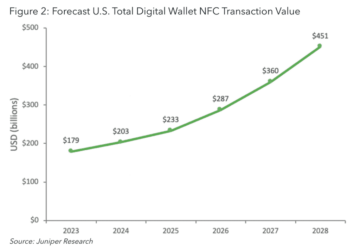Global credit card giant Mastercard and leading cryptocurrency exchange Binance parted ways last month, marking the end of one of the company’s most popular products in Latin America and potentially signaling a new strategy for the crypto giant.
In a surprising move, Binance announced the discontinuation of its Mastercard debit cards in the region, ending existing programs in Brazil, Argentina, Colombia, and Bahrain in the Middle East.
This decision comes at a challenging time for Binance as it faces significant legal issues in the United States. Regulators filed a lawsuit against the crypto exchange in June, accusing it of operating a “web of deception.” Binance has pledged to vigorously defend itself against these allegations.
Debit cards have played a crucial role in driving crypto adoption, with many crypto platforms offering them in recent years. These cards serve as a bridge between the virtual crypto world and the real economy, enabling users to make purchases both in physical and online stores. The decision to discontinue Mastercard debit cards has sparked concerns within the crypto community, given the increasing adoption of cryptocurrencies in daily life, and raised questions about whether Binance’s regulatory troubles are spooking its partners.
Binance LatAm: exchanges and crypto wallets
Neither company has clarified the reasons for terminating the deal. The partnership was launched over a year ago when Binance had expressed intentions to aggressively promote its services in South America. When it launched the prepaid card in Brazil, it had said Brazil was one of Binance’s ten-largest markets.
“Binance was part of a phenomenon where exchanges aspired to become virtual wallets,” says Ignacio Carballo, Head of Alternative Finance at Americas Market Intelligence. “But now the companies are backing down.”
The news comes as the company continues to grow in the region, even as it faces major legal risks in the United States and other markets. “Binance is reconsidering its strategy in Latin America,” Carballo said in an interview. “The payments product is not the most profitable for any of the exchanges that became wallets. Commissions on buying and selling of crypto assets are.”
Crypto still hot in LatAm
Latin America is an attractive market for crypto firms, given a significant adoption rate. Several of its countries rank among the highest users of the technology, according to Chainalysis, with stablecoins particularly powerful in inflation hotspots like Argentina or Venezuela. Or as a means to do remittances in Mexico and Central America.
With that in sight, the company has been busy this year building up alliances with fintechs and payment firms, to maximize its use cases in the real economy.


The firm partnered with travel giant Despegar recently, one of the leading travel brokers in the region, to allow its clients to pay for fares with crypto. It also announced a deal with Mobbex, a collection software provider for SMEs in Argentina, that will allow customers to pay through Binance Pay.
In August, Binance launched crypto remittances in Latin America, known as Send Cash. It will initially allow users in Colombia, Honduras, Guatemala, Argentina, Costa Rica, Paraguay, Dominican Republic, Panama, and Mexico to send funds to recipients with bank accounts in Colombia and Argentina. “At the lowest cost in the market,” the company said in a press release.
Regulatory trouble in the U.S.? Not so much in LatAm
Binance has been hit from all sides this year. Regulators have cracked down on the exchange, causing activity to plummet, and executives seem to be dropping like flies. Other exchanges are gaining on Binance and, while its lead is significant, pressure is mounting. If the SEC’s allegations of fraud are true, Binance could be heading for trouble.
But elsewhere in Latin America, there is no such thing. No major regulators in the region have taken aim at the crypto giant, although there is a broader risk for the industry stemming from more stringent regulation on the sector.
“There is no clear threat to Binance due to regulatory issues,” said Carballo, arguing nonetheless that broader crypto sector regulation could end up curbing the sector’s growth.
.pp-multiple-authors-boxes-wrapper.box-post-id-45383.pp-multiple-authors-layout-boxed.multiple-authors-target-shortcode.box-instance-id-1 .box-header-title { font-size: 20px !important; } .pp-multiple-authors-boxes-wrapper.box-post-id-45383.pp-multiple-authors-layout-boxed.multiple-authors-target-shortcode.box-instance-id-1 .box-header-title { font-weight: bold !important; } .pp-multiple-authors-boxes-wrapper.box-post-id-45383.pp-multiple-authors-layout-boxed.multiple-authors-target-shortcode.box-instance-id-1 .box-header-title { color: #000000 !important; } .pp-multiple-authors-boxes-wrapper.box-post-id-45383.pp-multiple-authors-layout-boxed.multiple-authors-target-shortcode.box-instance-id-1 .pp-author-boxes-avatar img { border-style: none !important; } .pp-multiple-authors-boxes-wrapper.box-post-id-45383.pp-multiple-authors-layout-boxed.multiple-authors-target-shortcode.box-instance-id-1 .pp-author-boxes-avatar img { border-radius: 5% !important; } .pp-multiple-authors-boxes-wrapper.box-post-id-45383.pp-multiple-authors-layout-boxed.multiple-authors-target-shortcode.box-instance-id-1 .pp-author-boxes-name a { font-size: 24px !important; } .pp-multiple-authors-boxes-wrapper.box-post-id-45383.pp-multiple-authors-layout-boxed.multiple-authors-target-shortcode.box-instance-id-1 .pp-author-boxes-name a { font-weight: bold !important; } .pp-multiple-authors-boxes-wrapper.box-post-id-45383.pp-multiple-authors-layout-boxed.multiple-authors-target-shortcode.box-instance-id-1 .pp-author-boxes-name a { color: #000000 !important; } .pp-multiple-authors-boxes-wrapper.box-post-id-45383.pp-multiple-authors-layout-boxed.multiple-authors-target-shortcode.box-instance-id-1 .pp-author-boxes-description { font-style: none !important; } .pp-multiple-authors-boxes-wrapper.box-post-id-45383.pp-multiple-authors-layout-boxed.multiple-authors-target-shortcode.box-instance-id-1 .pp-author-boxes-description { text-align: left !important; } .pp-multiple-authors-boxes-wrapper.box-post-id-45383.pp-multiple-authors-layout-boxed.multiple-authors-target-shortcode.box-instance-id-1 .pp-author-boxes-meta a span { font-size: 20px !important; } .pp-multiple-authors-boxes-wrapper.box-post-id-45383.pp-multiple-authors-layout-boxed.multiple-authors-target-shortcode.box-instance-id-1 .pp-author-boxes-meta a span { font-weight: normal !important; } .pp-multiple-authors-boxes-wrapper.box-post-id-45383.pp-multiple-authors-layout-boxed.multiple-authors-target-shortcode.box-instance-id-1 .pp-author-boxes-meta { text-align: left !important; } .pp-multiple-authors-boxes-wrapper.box-post-id-45383.pp-multiple-authors-layout-boxed.multiple-authors-target-shortcode.box-instance-id-1 .pp-author-boxes-meta a { background-color: #6adc21 !important; } .pp-multiple-authors-boxes-wrapper.box-post-id-45383.pp-multiple-authors-layout-boxed.multiple-authors-target-shortcode.box-instance-id-1 .pp-author-boxes-meta a { color: #ffffff !important; } .pp-multiple-authors-boxes-wrapper.box-post-id-45383.pp-multiple-authors-layout-boxed.multiple-authors-target-shortcode.box-instance-id-1 .pp-author-boxes-meta a:hover { color: #ffffff !important; } .pp-multiple-authors-boxes-wrapper.box-post-id-45383.pp-multiple-authors-layout-boxed.multiple-authors-target-shortcode.box-instance-id-1 .ppma-author-user_url-profile-data { color: #6adc21 !important; } .pp-multiple-authors-boxes-wrapper.box-post-id-45383.pp-multiple-authors-layout-boxed.multiple-authors-target-shortcode.box-instance-id-1 .ppma-author-twitter-profile-data span, .pp-multiple-authors-boxes-wrapper.box-post-id-45383.pp-multiple-authors-layout-boxed.multiple-authors-target-shortcode.box-instance-id-1 .ppma-author-twitter-profile-data i { font-size: 16px !important; } .pp-multiple-authors-boxes-wrapper.box-post-id-45383.pp-multiple-authors-layout-boxed.multiple-authors-target-shortcode.box-instance-id-1 .ppma-author-twitter-profile-data { background-color: #6adc21 !important; } .pp-multiple-authors-boxes-wrapper.box-post-id-45383.pp-multiple-authors-layout-boxed.multiple-authors-target-shortcode.box-instance-id-1 .ppma-author-twitter-profile-data { border-radius: 50% !important; } .pp-multiple-authors-boxes-wrapper.box-post-id-45383.pp-multiple-authors-layout-boxed.multiple-authors-target-shortcode.box-instance-id-1 .ppma-author-twitter-profile-data { text-align: center !important; } .pp-multiple-authors-boxes-wrapper.box-post-id-45383.pp-multiple-authors-layout-boxed.multiple-authors-target-shortcode.box-instance-id-1 .ppma-author-linkedin-profile-data span, .pp-multiple-authors-boxes-wrapper.box-post-id-45383.pp-multiple-authors-layout-boxed.multiple-authors-target-shortcode.box-instance-id-1 .ppma-author-linkedin-profile-data i { font-size: 16px !important; } .pp-multiple-authors-boxes-wrapper.box-post-id-45383.pp-multiple-authors-layout-boxed.multiple-authors-target-shortcode.box-instance-id-1 .ppma-author-linkedin-profile-data { background-color: #6adc21 !important; } .pp-multiple-authors-boxes-wrapper.box-post-id-45383.pp-multiple-authors-layout-boxed.multiple-authors-target-shortcode.box-instance-id-1 .ppma-author-linkedin-profile-data { border-radius: 50% !important; } .pp-multiple-authors-boxes-wrapper.box-post-id-45383.pp-multiple-authors-layout-boxed.multiple-authors-target-shortcode.box-instance-id-1 .pp-author-boxes-recent-posts-title { border-bottom-style: dotted !important; } .pp-multiple-authors-boxes-wrapper.box-post-id-45383.pp-multiple-authors-layout-boxed.multiple-authors-target-shortcode.box-instance-id-1 .pp-multiple-authors-boxes-li { border-style: solid !important; } .pp-multiple-authors-boxes-wrapper.box-post-id-45383.pp-multiple-authors-layout-boxed.multiple-authors-target-shortcode.box-instance-id-1 .pp-multiple-authors-boxes-li { color: #3c434a !important; }
- SEO Powered Content & PR Distribution. Get Amplified Today.
- PlatoData.Network Vertical Generative Ai. Empower Yourself. Access Here.
- PlatoAiStream. Web3 Intelligence. Knowledge Amplified. Access Here.
- PlatoESG. Carbon, CleanTech, Energy, Environment, Solar, Waste Management. Access Here.
- PlatoHealth. Biotech and Clinical Trials Intelligence. Access Here.
- Source: https://www.fintechnexus.com/binances-exit-from-mastercard-debit-cards-raises-questions-about-latam-strategy/
- :has
- :is
- :not
- :where
- ][p
- $UP
- 1
- a
- About
- According
- Accounts
- activity
- Adoption
- against
- aggressively
- ago
- aim
- aires
- All
- Allegations
- Alliances
- allow
- also
- alternative
- alternative finance
- Although
- america
- American
- Americas
- among
- an
- and
- announced
- any
- ARE
- Argentina
- AS
- Assets
- At
- attractive
- AUGUST
- avatar
- backing
- bahrain
- Bank
- bank accounts
- BE
- became
- become
- been
- between
- binance
- binance pay
- bold
- both
- Brazil
- BRIDGE
- broader
- brokers
- buenos
- Buenos Aires
- Building
- built
- busy
- Buying
- card
- Cards
- cases
- Cash
- causing
- Center
- central
- chainalysis
- challenging
- clarified
- clear
- clients
- code
- collection
- Colombia
- color
- comes
- commissions
- community
- Companies
- company
- Company’s
- Concerns
- continues
- Cost
- costa
- COSTA RICA
- could
- countries
- cracked
- credit
- credit card
- crucial
- crypto
- Crypto adoption
- crypto community
- crypto exchange
- crypto firms
- crypto sector
- crypto-assets
- cryptocurrencies
- cryptocurrency
- Cryptocurrency Exchange
- curbing
- Customers
- daily
- David
- deal
- Debit
- Debit Cards
- deception
- decision
- do
- down
- driving
- Dropping
- due
- East
- economy
- elsewhere
- enabling
- end
- ending
- Even
- exchange
- Exchanges
- existing
- Exit
- expertise
- expressed
- faces
- filed
- finance
- financial
- Financial Times
- fintech
- fintechs
- Firm
- firms
- For
- fraud
- from
- funds
- gaining
- giant
- given
- Global
- global market
- Grow
- Growth
- Guatemala
- had
- Have
- he
- head
- Heading
- highest
- Hit
- HONDURAS
- HOT
- hover
- HTTPS
- i
- if
- in
- increasing
- industry
- inflation
- initially
- Intelligence
- intentions
- Interview
- issues
- IT
- ITS
- itself
- journalist
- jpg
- june
- known
- Last
- LATAM
- Latin
- latin america
- Latin American
- launched
- lawsuit
- lead
- leading
- left
- Legal
- Legal issues
- Life
- like
- Lives
- lowest
- major
- make
- many
- Market
- Market Trends
- Markets
- marking
- mastercard
- Maximize
- means
- Mexico
- Middle
- Middle East
- Month
- more
- most
- Most Popular
- move
- much
- New
- New York
- New York Times
- news
- no
- None
- normal
- now
- of
- offering
- on
- ONE
- online
- operating
- or
- organizations
- Other
- over
- Panama
- Paraguay
- part
- particularly
- partnered
- partners
- Partnership
- Pay
- payment
- payments
- phenomenon
- physical
- Platforms
- plato
- Plato Data Intelligence
- PlatoData
- played
- Plummet
- Popular
- Post
- potentially
- powerful
- Prepaid
- Prepaid Card
- press
- Press Release
- pressure
- Product
- Products
- profitable
- Programs
- promote
- provider
- purchases
- Questions
- raised
- raises
- rank
- Rate
- real
- reasons
- recent
- recently
- recipients
- region
- regularly
- Regulation
- Regulators
- regulatory
- release
- Remittances
- reporter
- Reports
- Republic
- rica
- Risk
- risks
- Role
- s
- S&P
- S&P Global
- Said
- says
- sector
- seem
- Selling
- send
- serve
- Services
- several
- Sides
- Sight
- significant
- SMEs
- So
- Software
- solid
- South
- South America
- span
- sparked
- Stablecoins
- States
- Still
- stores
- Strategy
- such
- surprising
- taken
- Technology
- that
- The
- The Financial Times
- The New York Times
- The Washington Post
- Them
- There.
- These
- thing
- this
- this year
- threat
- Through
- time
- times
- to
- travel
- Trends
- trouble
- true
- u.s.
- United
- United States
- use
- users
- Venezuela
- Virtual
- Wallets
- was
- washington
- washington post
- ways
- when
- whether
- while
- will
- with
- within
- worked
- world
- year
- years
- york
- zephyrnet









